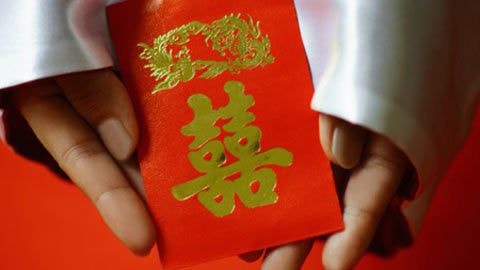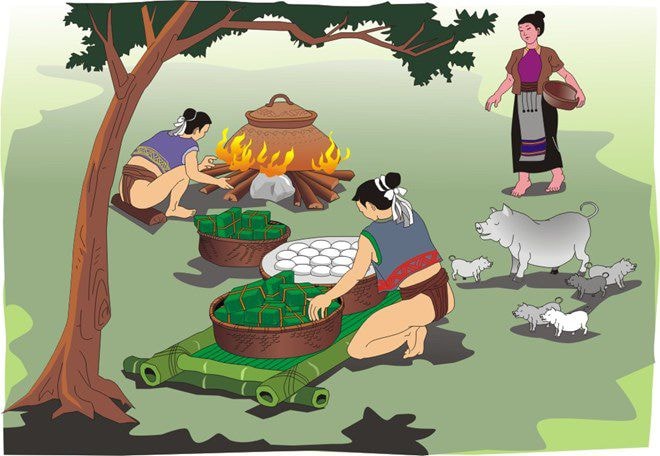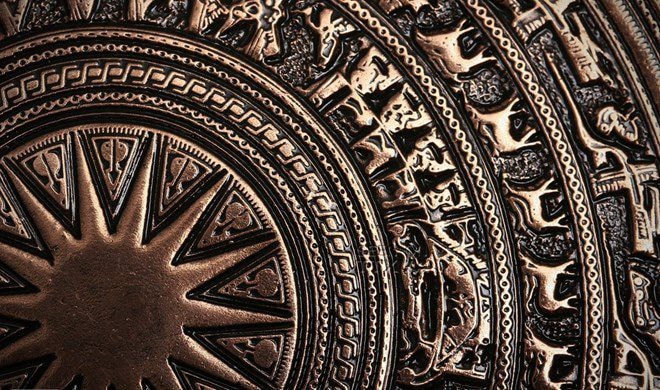Vietnamese Tet and the story of "Vietnamese people are ignorant of Vietnamese culture"
Because they are always obsessed with the idea that Vietnam is influenced by Chinese culture, everything is imported from China. How many people dare to think that Chinese customs are influenced by Vietnam?
In the West, most people call the Lunar New Year (Tết giao thời) Chinese New Year, because they believe that the Lunar Calendar was created by the Chinese and that the festivals and customs of the New Year also originated from China. That is normal, even many of us Vietnamese think so, let alone Europeans and Americans. However, that is a misunderstanding and the Vietnamese themselves are making that mistake worse.
 |
| Mung tuoi is a common word used by Vietnamese people, referring to a custom during Tet: giving relatives a "Gift" or a symbolic "sum of money" or sometimes just a Wish to "celebrate a new age". (Illustration photo) |
Let's do an experiment, type the word "Li Xi" into the Google search engine, the results returned in the open encyclopedia Wikipedia explain as follows: "Li Xi" originates from the word 利市 (loi thi) in Chinese. This word is transcribed in pinyin as li shì.
Next, we type the words "Mung Tuoi" into Google, the Wikipedia link about Li Xi appears first and many Vietnamese people click on it to read and trust it. It's so perfect that many people come to the conclusion: "Li Xi or Mung Tuoi is a Tet custom originating from China".
Let me tell you the difference between Lucky Money and Lucky Money. Lucky Money is a common word used by Vietnamese people, referring to a custom during Tet: giving relatives a "Gift" or a symbolic "sum of money" or sometimes just a Wish to "celebrate a new age".
Li Xi is a word commonly used by Southern Vietnamese. This word was imported from China when the Chinese immigrated to Vietnam, it refers to giving someone (any day, not just Tet) a red envelope containing a symbolic amount of money to wish for "luck and many benefits".
Putting that aside, what is important here? That most of us “learn our nation’s history and culture through Google”. If you want to know where Mid-Autumn Festival originated, you can Google it and it says it’s from China. If you want to know where Tao Quan originated, you can Google it and it says “from China”. Even if you want to know where Kinh Duong Vuong originated, you can Google it and it says he’s a descendant of a Chinese god.
 |
| Lucky money refers to giving someone (any day, not just Tet) a red envelope containing a symbolic amount of money to wish for "luck and many benefits" (Illustration photo) |
"Our people must know our history. If you don't know anything, look it up on Google." This is a joke, but sadly it is true. The fault is not with Google, it is just a search engine based on available content, the fault is not with fate, if anything it is the superficiality when it comes to the culture and history of our country, if anything it is the "cultural slave mentality" of those who create content on the Internet.
Why is it called "cultural slave mentality"? Because their general formula is as follows: Want to know the origin of a custom in Vietnam => Find out if there is a similar custom in China => If there is, conclude "That custom originated from China". Because they are always obsessed with the idea that Vietnam is influenced by Chinese culture, so everything is imported from China. How many people dare to think that Chinese customs are influenced by Vietnam or that there are customs of two independent countries that are unrelated to each other.
They draw conclusions with such a “slave” mindset without actually conducting a serious study, without even bothering to find out when Vietnamese customs began to compare in terms of time, the most basic thing in studying cultural influence. The Vietnamese academic historical documents (archeological documents, anthropological documents, ancient books...) that I have read, nowhere conclude such an ambiguous issue.
True historians have asked historical questions for decades, but they only dare to put forward hypotheses to "temporarily answer", not to mention that their hypotheses are built on a massive research project, going to every corner, digging up every piece of land, reading every word in ancient documents, cherishing every bone sample and every artifact.
Our nation has endured many ups and downs, which has resulted in many obscure and blank spaces in the flow of history, with many mysteries that are difficult to unravel. But we cannot, because of these difficulties, hastily assume and explain everything by the cultural influence of a country that is the culprit in bringing dirt, rocks, sand and dust to the paths of our nation.
In this article, I will not present arguments and evidence to conclude: Vietnamese people have their own Tet holiday without being influenced by any other country. Because I want you, like me, to read official documents (maybe right now you can re-read the story of Banh Chung - Banh Giay), scientific and serious research works on the history and culture of the nation, through which you can draw your own conclusions. You can use Google, but use it wisely, it is a tool, not your boss.
 |
| The Vietnamese custom of wrapping Chung cake and Day cake has existed since ancient times (Illustration photo) |
I just want to say two things:
1. You do not understand the true extent of the nation's original culture.
Do you think Rice Civilization is only about rice? No, it is also about the technique of making agricultural tools (archaeology shows that since ancient times we have had plowshares made of bronze and many other types of agricultural tools, more advanced is the technique of casting bronze), it is the technique of domesticating animals (buffalo, cows), it is the technique of controlling water (the story of Son Tinh - Thuy Tinh), it is cuisine, it is cultural festivals, it is the way to calculate time for farming...
Bronze civilization, developed very early and flourished in Vietnam, besides the Bronze Drum, if you see the images of the artifacts (which have been dated by spectroscopy), from the Hung King period, you will surely exclaim "so sophisticated" and you will not be able to doubt the remarkable development of our ancestors at that time. What did the ancient Vietnamese do with bronze axe blades? They had houses. What did they do with bronze arrows? They had wild animal feasts. What did they do with bronze knives? They had armies. And thousands of other artifacts can show you a prosperous and rich life of the Van Lang residents.
What do you think if I say that at that time, Vietnamese people only wore loincloths and lived in caves? You should be skeptical, because research from ancient Dong Ho paintings and bronze statues (belonging to Dong Son culture) has shown that the costumes of Vietnamese people at that time were not much different from the costumes of Northern women about 100 years ago.
Besides, the discovery of bronze drums with similar patterns but of newer date in neighboring countries proves that they had extensive trade. The engraved boats are evidence of the birth of fishing in ancient times. When we fish, grow rice, ... have meals without having to go to the forest, while others have to grind their butts on horseback waiting for an innocent deer to fall before sunset, who is the savage?
Where the Lunar Calendar originated from, I am not sure, I only know that I can look at the length of my shadow to predict the time, look at the degree of waxing and waning of the Moon to predict the date, so what about our ancestors who created a brilliant Rice Civilization.
If there is a nation that needs a calendar (a way to divide time in its cycle), one of them is the Vietnamese, because no profession needs it more than agriculture. The Vietnamese may not have invented the lunar calendar, but certainly since the time the lunar calendar did not exist or had not yet come to Vietnam, they used another type of calendar, which could be clearly defined, perhaps only by experience, word of mouth or symbolic drawings. Surely they knew how long the cold winter weather would repeat, and how many full moons there would be during that time.
 |
| The images of the patterns on the Dong Son bronze drum partly reflect the life of ancient Vietnamese people (Illustration photo) |
2. You don't fully understand Vietnamese people (you don't fully understand yourself)
Most of the ancient documents recorded by the Northerners (including the copy of Confucius), except for the places where they called the Southerners barbarians, all have one thing in common: "Southerners are gentle, like to dye their teeth, tattoo themselves, like to sing and dance". That is certainly true, the people who work every day in the fields and on the rivers are of course gentle, honest, straightforward, and simple.
That is also the reason why we were invaded so easily and occupied for thousands of years, but a strong original culture explains why not only after a thousand years of occupation did we not forget our roots but also accumulated a spirit of protecting our territory and the survival of our race more fiercely than any other nation.
Researching the patterns on the surface of the Bronze Drum, people believe that these drawings reflect the activities of people in a year, according to the season. Festivals (praying for rain, fertility ...) were held between crops (leisure farming), of course our Tet is the same, you can see that after today's Lunar New Year is a new crop.
Mentioning the Bronze Drum, you think it is an antique, but at that time it was a musical instrument, not just a musical instrument, it was a musical instrument serving community activities. Gongs, bells, leather drums, clappers... are all community musical instruments and have appeared since the Hung King period. What do people do with such musical instruments? Of course, dancing. On the surface of some bronze drums there are also handles, the function of which may be to hang a rope and carry it to serve the processions.
Vietnamese people especially love music (not only musical instruments but also genres of singing, singing, love songs...) and festivals. And it is the traditional festivals that make up Vietnamese culture.
Conclusion:
Maybe our culture is heavily influenced by Chinese culture, but let's be proud because our ancestors have created a foundation enough for Vietnamese culture to thrive without borrowing. One thing I often say, when you grow up eating rice, sticky rice, banh chung, vermicelli, pho, banh uot, banh beo, banh xeo, banh khot... (dishes made from rice), you have been raised by the rice civilization. It is around you, everywhere, feel it, when you see yourself living in it, you are a Vietnamese, and even if you watch Japanese movies, listen to Korean music, wear Chinese makeup, dress Western style, you still do not lose yourself. We have everything enough to build national pride.
In recent days, on many online forums, there have been debates about whether it is correct to use the phrase "Chinese New Year" or "Lunar New Year" to refer to the traditional Vietnamese Lunar New Year. This article expresses the reader's point of view - author Dong Tuyen on the topic of the debate and the author's thoughts on the issue of researching, studying, and learning about Vietnamese culture among today's youth. |
According to Infonet






